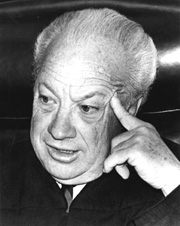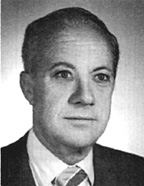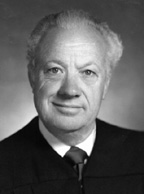|
THE HONORABLE PHILIP CHARLES WILKINS
1913-1998 Senior United States Judge Eastern District of California by Andrea M. Miller, Attorney Nageley & Meredith Inc. | 
|
|
THE HONORABLE PHILIP CHARLES WILKINS
1913-1998 Senior United States Judge Eastern District of California by Andrea M. Miller, Attorney Nageley & Meredith Inc. | 
|
The Honorable Philip C. Wilkins was more to his clerks and staff than our "boss" and we were much more to him than his employees. He was our mentor and our surrogate father. We were his kids. What did he teach us as our mentor and how did he do it? He taught us how we could be honorable members of our profession and he did it by example. And, when it was necessary, he humbled us.
The Judge was "honorable" both because of his appointment to the federal bench, but also because of his service to his political party and his profession. But, most importantly, he was honorable because he never lost track of who he was and that was indeed a fine thing to be.
The Judge had absolutely no pretensions. One of his new law clerks became agitated upon learning he would be expected to drive and accompany the Judge to his Bohemian Club functions. This clerk was worried that a person of the Judge's stature would be embarrassed by the clerk's meager wardrobe and his five year old Volkswagen Beetle. Then the other clerks told him that the Judge drove a Volkswagen Beetle that was nine years older than his and that the Judge's idea of spiffing up was to wear a tie with his polo shirt. No pretensions.
On many occasions the Judge would ask a clerk to accompany him on a walk around town while he mulled over a particularly difficult issue. When you walked with the Judge you met many people because many people knew and liked the Judge and few of them hesitated to stop him on the street to chat. The clerk would be introduced to the visitor by first name, words would be shared, and only when the person walked on would you learn that the person you had just met was Jimmy the Shoeshine man, or a state legislator, or the janitor from the Judge's old building, or a prominent attorney or state court judge. You certainly could not have guessed the person's stature by the way the Judge addressed him or her because the Judge treated everyone with the same attention and respect. No pretensions.
The Judge always made sure we knew he thought we were very smart, but that this was not enough by half. His clerks also had to be good, and that meant being dedicated to the client and to the rule of law. A clerk once made a waspish remark about an attorney appearing in the Judge's court and was reminded that the lawyer might not be as smart as she but he had a client for whom he was doing his dead level best and he deserved to be treated with respect for that. The Judge also informed the clerk that it was much easier to respect the mediocre man working hard for his client than the very smart woman merely being clever. Clerks were allowed no pretensions either.
We who clerked for Judge Wilkins desperately wished him to be proud of and to respect us. To achieve these goals we had to strive to remain free of pretension and to display our true characters, to attempt to treat each man and woman with equal respect despite their station or appearance, and to keep our promises or, if we doubted our ability to do so, to refrain from making them. Fail though we may in these endeavors, all of us will continue to strive to measure up to the example he set us.
One could ask no more from a mentor.
 Philip C. Wilkins was born in January of 1913 and was raised in the Sacramento area. He graduated from the
University of California, Hastings College of Law in 1939 and passed the California State Bar examination during
the same year. He began his law practise in Sacramento in January of 1940.
Philip C. Wilkins was born in January of 1913 and was raised in the Sacramento area. He graduated from the
University of California, Hastings College of Law in 1939 and passed the California State Bar examination during
the same year. He began his law practise in Sacramento in January of 1940.
In 1941 he married the former Sue Robinson. A year later he enlisted in the United States Navy, serving as a communications intelligence officer in the Pacific Fleet under Admiral Chester W. Nimitz for the duration of the World War II. He was honorably discharged in 1945 as a full Lieutenant.
After the war Wilkins resumed private practise of the law and became very involved in Republican politics, serving as a member of the state central committee from 1954-58. He also served as a delegate to the national Republican conventions in 1948, 1952 and as an alternate in 1952. Over the years, Wilkins developed a close friendship with California Governor Earl Warren, who later became the Chief Justice of the Supreme Court. The two were baseball enthusiasts, attending many World Series together.
In 1969, Wilkins was appointed as United States District Judge for the Eastern District of California by President Richard M. Nixon. He served as Chief Judge from January 15, 1979 until January 27, 1983, at which time he took senior status.
Judge Wilkins was regarded by colleagues and friends as a fair, even tempered and compassionate man. A former court reporter attested to the Judge's even-temperament, noting that the strongest thing he'd ever heard the Judge say to a criminal defendant was, "You better bring your toothbrush." A former law clerk recalled the judge's dedication to hard work and high ethical standards. "If you did something that got you a little sun, the judge would see your tan and remark how you needed a little extra work to bring back a law clerk pallor."
Judge Wilkins first civil case was brought by U.S. District Judge Lawrence K. Karlton, then a young lawyer. The issue revolved around Chicago Seven radical Tom Hayden (now a California State legislator), whose scheduled appearance before the CSUS student body was blocked by the University's administration. Although Karlton recalled that Judge Wilkins clearly sympathized with the administration, he issued an injunction and overturned the administration's decision.
Judge Wilkins also presided over the high-profile Steven Soliah bank robbery trial. Soliah was the only person charged in the 1975 robbery, during which a woman was killed. Despite suspected links to the Symbionese Liberation Front, Soliah was later acquitted. The infamous organization was responsible for the kidnapping of newspaper heiress Patty Hearst, who later joined with the group.
 Chief Judge William B. Shubb has proclaimed that a portrait of Judge Wilkins, presented by his former law clerks,
will be hung in the lawyer's lounge in the new courthouse being completed in Sacramento. The selection was
deemed most suitable as Judge Wilkins was considered a "lawyers judge."
Chief Judge William B. Shubb has proclaimed that a portrait of Judge Wilkins, presented by his former law clerks,
will be hung in the lawyer's lounge in the new courthouse being completed in Sacramento. The selection was
deemed most suitable as Judge Wilkins was considered a "lawyers judge."
Judge Wilkins numerous professional activities included: member of the Sacramento County Bar Association, serving as President in 1964; member of the Judicial Qualifications Committee; American Bar Association; Federal Judges Association; California State Bar Association; delegate to the Joint Meeting of the American and British Bar Associations in London, England in 1957 and Scotland in 1971.
His community activities included: member of the Native Sons of the Golden West, serving as Grand President in 1953-54; American Legion; Del Paso Country Club, Sacramento; Bohemian Club, San Francisco; Hastings Alumni Association; Hastings 1066 Club; Robert Gordon Sproul Associates, University of California.
© 2001 United States District Court for the Eastern District of California Historical Society.